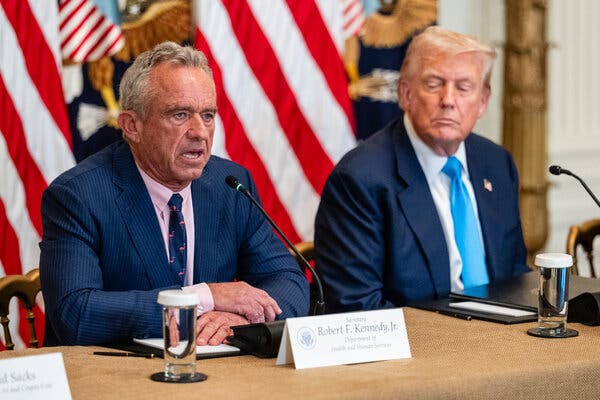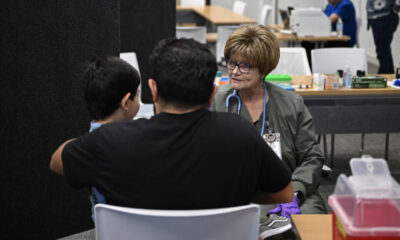Health
U.S. Health Department Revives Vaccine Safety Panel After 25 Years

The U.S. Department of Health and Human Services (H.H.S.) has reinstated the Task Force on Safer Childhood Vaccines, a group that was disbanded in 1998. This move aligns with the ongoing efforts of the Trump administration to closely examine childhood vaccinations received by American children. The task force was initially established following the passage of a law that addressed claims of injuries attributed to vaccines.
The revival of this panel comes amid growing debates about vaccine safety in the United States. Notably, the initiative has received backing from Children’s Health Defense, an anti-vaccine group led by Health Secretary Robert F. Kennedy Jr.. The organization has expressed that the task force is vital for promoting safer immunization practices.
Commitment to Vaccine Safety
Dr. Jay Bhattacharya, director of the National Institutes of Health (N.I.H.), emphasized the importance of this task force in a recent statement. He stated, “By reinstating this Task Force, we are reaffirming our commitment to rigorous science, continuous improvement, and the trust of American families.” Dr. Bhattacharya will chair the task force, which will include senior leaders from the N.I.H., the Food and Drug Administration (F.D.A.), and the Centers for Disease Control and Prevention (C.D.C.).
The health department plans to submit the task force’s first formal report to Congress within two years, with subsequent updates every two years thereafter. While the overarching goal of enhancing vaccine safety is widely supported, experts caution against misinterpretations that could suggest current vaccines are dangerous.
Dr. Eric Rubin, editor-in-chief of The New England Journal of Medicine and an adviser to the F.D.A. on vaccine matters, expressed his concerns. He hopes the task force will not “overemphasize potential, and very theoretical, risks over the benefits” of childhood immunizations.
Impact of Vaccines on Public Health
According to the Centers for Disease Control and Prevention, childhood vaccines have been instrumental in saving over 1.1 million lives and preventing approximately 32 million hospitalizations among children born between 1994 and 2003. Additionally, these vaccines have contributed to societal savings of around $2.7 trillion in healthcare costs.
Dr. Ofer Levy, director of the precision vaccines program at Boston Children’s Hospital, highlighted the critical role vaccines play in children’s health. He stated, “For 99.99999 percent of the kids, vaccines are a huge win and critical for their healthy growth and development.” This sentiment underscores the importance of balancing safety discussions with the established benefits of vaccination.
The inclusion of N.I.H., F.D.A., and C.D.C. representatives on the task force is seen as a positive step by experts like Dr. Rubin, who noted that the selection of additional members will be crucial. He remarked, “I hope that they get people who are well-trained and thoughtful.”
The revival of the Task Force on Safer Childhood Vaccines represents a significant moment in the ongoing discourse about vaccine safety and public health. As the task force prepares to begin its work, the focus will be on ensuring that the benefits of childhood immunizations continue to be recognized while addressing any concerns about safety.
-

 Science1 month ago
Science1 month agoNostradamus’ 2026 Predictions: Star Death and Dark Events Loom
-

 Technology2 months ago
Technology2 months agoOpenAI to Implement Age Verification for ChatGPT by December 2025
-

 Technology7 months ago
Technology7 months agoDiscover the Top 10 Calorie Counting Apps of 2025
-

 Health5 months ago
Health5 months agoBella Hadid Shares Health Update After Treatment for Lyme Disease
-

 Health5 months ago
Health5 months agoAnalysts Project Stronger Growth for Apple’s iPhone 17 Lineup
-

 Technology5 months ago
Technology5 months agoElectric Moto Influencer Surronster Arrested in Tijuana
-

 Education5 months ago
Education5 months agoHarvard Secures Court Victory Over Federal Funding Cuts
-

 Health5 months ago
Health5 months agoErin Bates Shares Recovery Update Following Sepsis Complications
-

 Technology7 months ago
Technology7 months agoMeta Initiates $60B AI Data Center Expansion, Starting in Ohio
-

 Technology6 months ago
Technology6 months agoDiscover How to Reverse Image Search Using ChatGPT Effortlessly
-

 Science4 months ago
Science4 months agoStarship V3 Set for 2026 Launch After Successful Final Test of Version 2
-

 Technology7 months ago
Technology7 months agoRecovering a Suspended TikTok Account: A Step-by-Step Guide





















